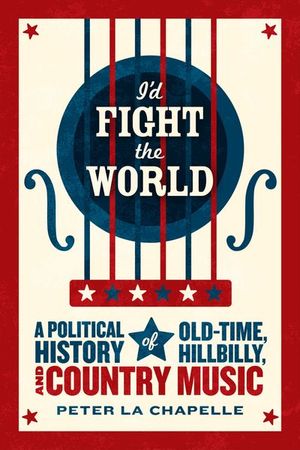I'd Fight the World
Published by The University of Chicago Press
A “educational, interesting, and very easy to read” history of the bond between country music and politics in America (Harry Reid).
Long before the United States had presidents from the world of movies and reality TV, we had scores of politicians with connections to country music. In I’d Fight the World, Peter La Chapelle traces the deep bonds between country music and politics, from the nineteenth-century rise of fiddler-politicians to more recent figures like Pappy O’Daniel, Roy Acuff, and Rob Quist. These performers and politicians both rode and resisted cultural waves: some advocated for the poor and dispossessed, and others voiced religious and racial anger, but they all walked the line between exploiting their celebrity and righteously taking on the world. La Chapelle vividly shows how country music campaigners have profoundly influenced the American political landscape.
Praise for I’d Fight the World
“Thoroughly researched and insightful, I’d Fight the World exposes the political themes embedded in country music of all stripes, as well as the sometimes subtle, sometimes blatant, always shrewd employment of this music by politicians. La Chapelle reveals a political legacy in country music that today’s audiences have an obligation to confront.” —Jocelyn Neal, author of Country Music: A Cultural and Stylistic History
“In this well-written and expansive book, La Chapelle narrates a national history of politics and country music, from nineteenth-century populism to post–World War II conservatism. I’d Fight the World demonstrates how both political and cultural history can shine light upon each other, creating a rich tapestry of scholarship.” —David Gilbert, author of The Product of Our Souls
“Lively and informative. . . . This book will surprise those who have preconceived notions about country music and Southern politicians, and their longstanding connection.” —Library Journal
“A deeply researched examination of the ways that country and old-time music have been coopted into political life. . . . La Chapelle traces the not especially healthy relationship between country music and populism. . . . La Chapelle’s exhaustive examination of his subject uncovers many untold stories and raises interesting questions about whether country music has yet truly reckoned with its political past.” —Times Literary Supplement
Long before the United States had presidents from the world of movies and reality TV, we had scores of politicians with connections to country music. In I’d Fight the World, Peter La Chapelle traces the deep bonds between country music and politics, from the nineteenth-century rise of fiddler-politicians to more recent figures like Pappy O’Daniel, Roy Acuff, and Rob Quist. These performers and politicians both rode and resisted cultural waves: some advocated for the poor and dispossessed, and others voiced religious and racial anger, but they all walked the line between exploiting their celebrity and righteously taking on the world. La Chapelle vividly shows how country music campaigners have profoundly influenced the American political landscape.
Praise for I’d Fight the World
“Thoroughly researched and insightful, I’d Fight the World exposes the political themes embedded in country music of all stripes, as well as the sometimes subtle, sometimes blatant, always shrewd employment of this music by politicians. La Chapelle reveals a political legacy in country music that today’s audiences have an obligation to confront.” —Jocelyn Neal, author of Country Music: A Cultural and Stylistic History
“In this well-written and expansive book, La Chapelle narrates a national history of politics and country music, from nineteenth-century populism to post–World War II conservatism. I’d Fight the World demonstrates how both political and cultural history can shine light upon each other, creating a rich tapestry of scholarship.” —David Gilbert, author of The Product of Our Souls
“Lively and informative. . . . This book will surprise those who have preconceived notions about country music and Southern politicians, and their longstanding connection.” —Library Journal
“A deeply researched examination of the ways that country and old-time music have been coopted into political life. . . . La Chapelle traces the not especially healthy relationship between country music and populism. . . . La Chapelle’s exhaustive examination of his subject uncovers many untold stories and raises interesting questions about whether country music has yet truly reckoned with its political past.” —Times Literary Supplement
BUY NOW FROM
COMMUNITY REVIEWS
